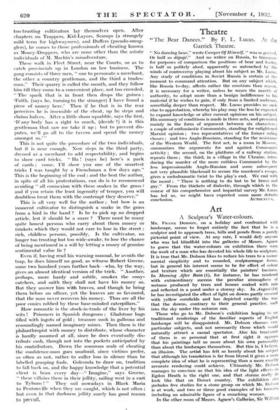Theatre
"The Bear Dances." By F. L. Lucas. At the Garrick Theatre.
"No dancing bear,” wrote Cowper Of Himself," was so genteel, Or half so &gage." And no writer on Russia, to transpose for purposes of comparison the positions of bear and leader, is half so politely aloof, apparently so untouched by the winds of controversy playing about his subject as Mr. Lucas. Any study of conditions in Soviet Russia is certain at the moment to command attention. But on any subject which, like Russia to-day, affects rather the emotions than reason, it is necessary for a writer, unless he wears the mantle of authority, to adopt more than a benign indifference to his material if he wishes to gain, if only from a limited audience, something deeper than respect. Mr. Lucas provides no such clue to approbation, whereby his play may the less be expected to expand knowledge or alter current opinions on his subject. His summary of conditions is made in three acts, and presented mainly in the form of argument between six characters : a couple of enthusiastic Communists, standing for enlightened Marxist opinion ; two representatives of the former ruling classes ; and two Anglo-Russians, standing for the resistance of the Western World. The first act, in a room in Moscow, summarizes the arguments for and against Communist activity ; the second, on the platform of a railway station, repeats them ; the third, in a village in the Ukraine, intro- ducing the murder of the more ruthless Communist by the less impressionable Anglo-Russian and some subsequent not very plausible blackmail to secure the murderer's escape, gives a melodramatic twist to the play's end. We end with the moral : "There is nothing to do but to be brave and gay." From the thickets of dialectic, through which in the course of his comprehensive and impartial survey Mr. Lucas has led us, we might have expected some more definite










































 Previous page
Previous page